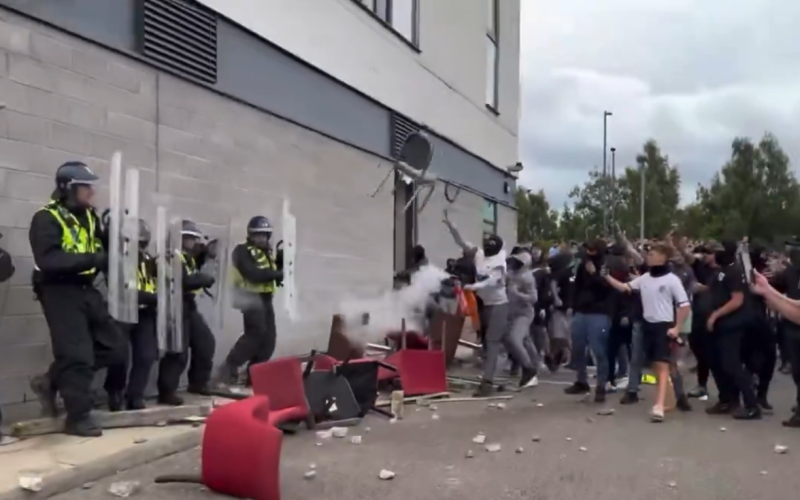This is England. pic.twitter.com/5Ydd187FFu
— RadioGenoa (@RadioGenoa) January 4, 2025
In recent weeks, the United Kingdom has been rocked by protests, violence, and civil unrest. These events, fueled by misinformation and deep-rooted societal tensions, have painted a grim picture of the state of inter-community relations in one of the world’s most diverse societies. At the heart of the unrest is a painful truth: fear, division, and intolerance are not only deeply ingrained in some sections of the population but have also been manipulated by far-right groups, leading to violence that affects innocent communities.
The Roots of the Protests: Misinformation, Fear, and Hate
The origins of the violence can be traced to a tragedy—the death of three young girls in Southport on July 29, 2024, as the result of a brutal attack. As details of the incident emerged, misinformation spread like wildfire. Social media platforms, often rife with unverified and inflammatory content, quickly circulated rumors that the perpetrator was a Muslim asylum seeker, despite there being no confirmation or evidence to support these claims.
In the absence of accurate information, fear took hold. Fear of “the other,” fear of outsiders, and fear of a growing “foreign” presence that many believed was destabilizing their communities. This fear, amplified by misleading stories, sparked violent protests across towns such as Manchester, Liverpool, and Nottingham. Attacks on mosques, immigrant accommodations, and clashes with police became the norm.
But these events weren’t just about an isolated incident—they were symptomatic of a larger, festering issue. For years, there has been a growing undercurrent of Islamophobia and anti-immigrant sentiment across the UK. This wave of violence was merely the latest manifestation of these tensions, stoked by far-right groups seeking to use the chaos as a platform for their xenophobic agenda.
Why Is This Happening?
The underlying causes of the current unrest are multifaceted, and simply attributing it to one factor does a disservice to the complexity of the issue. But there are some key reasons why these protests turned violent:
- Misinformation and Social Media: In an age where news travels faster than fact-checking, misinformation spreads like wildfire. In this case, the rumor that the attacker was a Muslim was a toxic spark that set off the powder keg of existing tensions. Social media platforms, especially Twitter and Facebook, have become vehicles for the dissemination of unverified, inflammatory content. This has made it easier for extremists to fuel fear and hatred by targeting vulnerable communities. The Times of India highlights how social media misinformation played a key role in the escalation of these protests.
- Islamophobia and Xenophobia: For years, Muslim communities in the UK have felt the weight of suspicion and prejudice. Islamophobia has become so entrenched in certain parts of society that it is now almost normalized. Far-right groups have exploited this sentiment, claiming that Muslims and immigrants are taking over and endangering British values. This rhetoric feeds into the narrative of “us vs. them,” stoking division in an already fragmented society. According to Le Monde, Muslims in the UK are increasingly fearful after the rise of these violent demonstrations.
- Far-Right Groups: Groups like the English Defence League (EDL) and individuals such as Tommy Robinson have played an instrumental role in organizing and promoting these protests. They have capitalized on public fears surrounding immigration and radical Islam to stoke violence. Their messages have resonated with those who feel that their cultural identity is under threat. The Independent discusses how far-right movements have contributed to the growing unrest in Britain.
- Socio-Economic Issues: Economic inequality and a sense of disenfranchisement also play a role. Many of those involved in these protests are from working-class backgrounds, struggling with unemployment and poor living conditions. They are looking for someone to blame, and immigrants and Muslims—easy targets in the current climate—become convenient scapegoats. In times of economic hardship, it’s all too easy for populist rhetoric to flourish, offering simplistic solutions to complex problems. USACANews recently published an article on the impact of economic inequality on societal unrest, which is directly relevant to the situation in the UK.
How Can This Be Handled?
The current situation demands a nuanced, rational approach—not one driven by political bias or extremist ideologies. There are several ways forward, though they require bold action and a willingness to confront uncomfortable truths.
- Combating Misinformation: The rapid spread of misinformation must be addressed head-on. Social media platforms need to take more responsibility for the content they host, ensuring that false narratives are flagged and corrected swiftly. More importantly, communities must be educated in critical thinking, teaching individuals to question and verify information before reacting. When fear is driven by lies, the consequences can be devastating. Reuters reports on how some communities are taking steps to empower themselves in the face of this growing misinformation.
- Promoting Interfaith and Intercommunity Dialogue: The solution to division lies in dialogue. For far too long, Muslim and non-Muslim communities have lived in parallel, often not understanding each other’s fears, hopes, and aspirations. The UK must foster genuine dialogue between different religious and ethnic groups. Interfaith initiatives, community outreach programs, and collaborative projects can help dispel myths and build understanding. This is not just about tolerance; it’s about acceptance and shared identity in a multicultural society. At USAcaNews, efforts to bring together divided communities through dialogues and joint initiatives are seen as key to combating hate.
- Tackling Far-Right Extremism: Far-right groups and individuals who perpetuate hate speech and violence must be held accountable. While freedom of speech is fundamental, inciting violence and spreading hate should not be tolerated. Legal frameworks must be adjusted to ensure that hate speech is met with appropriate consequences. At the same time, the government should ensure that law enforcement agencies are equipped to deal with the growing threat of far-right extremism, just as they have in addressing Islamic extremism. The Times of India provides a broader view of how these groups are operating in the UK.
- Addressing Economic Inequality: One of the root causes of societal unrest is the growing gap between the rich and the poor. Economic hardship breeds resentment, and when combined with a sense of cultural or racial alienation, it becomes a powerful force for division. The UK needs to invest in creating job opportunities, improving education, and tackling poverty—especially in working-class areas where resentment against immigrants tends to be most acute. USAcaNews offers insights into the socio-economic factors that contribute to social instability, which are relevant to understanding the UK situation.
- A Government Response Focused on Unity, Not Division: Government leaders must adopt a tone of unity, not division. While some politicians have fueled these divides with inflammatory rhetoric, it’s vital for those in positions of power to lead by example, condemning hate in all its forms. Instead of using these events to further political agendas, leaders must focus on healing the rifts in society, showing empathy for both those who feel marginalized and those who fear change. Le Monde calls for political leaders to take a stand against the divisive rhetoric and promote unity.
A Divided Britain Can Be United
The situation in the UK is troubling, to say the least. The country is at a crossroads, where the future of its multicultural society hangs in the balance. But the key to moving forward lies not in further division, but in a collective effort to understand one another. It requires courage from all sides—Muslims, non-Muslims, immigrants, and native Britons—to confront their fears, acknowledge their biases, and build a society where diversity is celebrated, not feared.
In the end, the UK is not a land of division but of potential. A society that has always prided itself on being a melting pot of cultures can weather this storm if the right steps are taken. The solution lies in truth, understanding, and unity. Only by addressing the root causes of division and creating a more inclusive society can Britain hope to heal and move forward.





